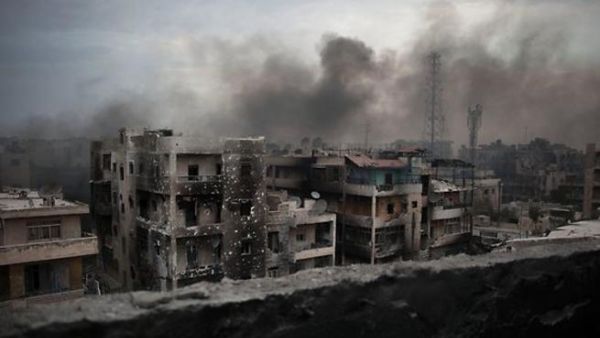Syria's deputy prime minister and minister of trade declared this week that the country's economy would suffer "heart failure" if the crisis that has been sweeping the country over the last 18 months continues for another three months, reports Bassel Oudat. "There is no solution except a political one, and without it there will be no economic, security or military resolution," he said.
"We have entered into a crisis without calculating the repercussions of the European and US sanctions," the minister said on Syrian television. "We import half our consumption of diesel fuel. The situation today is much worse than it was one month ago, when no one imagined that humanitarian conditions would deteriorate so badly in some regions of Syria."
The minister added that economic solutions alone would not succeed because military and security factors were the deciding factors. "The economy and production are collapsing, and there is no liquidity, indicated by the drop in value of the Syrian lira in comparison to the Euro and dollar. If the crisis continues, Syria's economy will have a heart attack," he said.
The minister, appointed only two months ago, said there was a crisis of transportation and fuel in Syria as corruption and smuggling spread, along with the other problems that ail the Syrian economy.
However, despite these statements it seems that the Syrian government as a whole is in denial about an economic meltdown. The prime minister denied there were economic problems and asserted that the crisis was "in its last phase thanks to citizens' support for the leadership and the work of the armed forces."
He added that the condition of the economy was "reassuring. We have enough to cover the needs of our people in terms of commodities, food, pharmaceuticals and oil products," the prime minister said.
Nevertheless, UN and Arab League envoy to Syria Lakhdar Brahimi has also highlighted the economic and humanitarian crisis facing the Syrian people. Brahimi painted a bleak picture of the situation in the country, warning in a report to the UN Security Council that the "war in Syria is worsening and a food crisis is looming."
Brahimi argued that reform would not be enough to resolve the crisis and that root-and-branch change was needed.
Observers agree that the Syrian economy is in crisis after 18 months of protests against the regime led by president Bashar al-Assad, with signs of economic collapse beginning to emerge once the regime resorted to a military clampdown across the country using heavy artillery and war planes to bomb the strongholds of the armed opposition in towns and cities.
Syrians have been suffering from hikes in fuel and gas prices, which have gone up multiple times. There is also a shortage of food and medical supplies and rising unemployment as private-sector companies and factories buckle under the pressure of the recession.
More than half of the country's larger factories and small- and medium-sized workshops have shut down.
A large number of Syrian businessmen and investors have relocated their businesses outside the country, and industrialists have dismantled factories and set up shop in other Arab states.
The state-owned Syrian General Organisation of Engineering Industries announced that it had shut eight of the 12 companies it owns because of sabotage, looting, burning of production lines and warehouses, and the destruction of machines.
The organisation's move is one of many measures indicating the collapse of the Syrian economy.
Agricultural and livestock production is also in a bad way. The country's agricultural sector is suffering from problems including access to seeds, fertilisers and animal feed, and there is no irrigation in some areas because of the deteriorating security situation.
There have also been transportation and marketing difficulties because of unsafe roads inside the country, as well as military forces burning crops in some regions. Syria's minister of agriculture recently suggested that Syrians should grow their own vegetables and raise hens in their homes to meet their needs.
Two weeks ago, the government raised the price of diesel fuel by eight per cent, the third hike this year, amid crippling shortages and the availability of gas cylinders and other basic commodities only on the black market.
As winter approaches, five million Syrian families are waiting for diesel fuel and fear that they will not have enough for the cold winter months ahead, especially after the government declared that Syria's diesel fuel production only covered 70 per cent of the population's needs.
According to EU estimates, 2.5 million Syrians now need humanitarian relief, compared to only one million six months ago, including the 1.2 million who have been forced to flee their homes. The EU asserted that rising violence and difficulties in reaching civilians in need were obstacles to delivering humanitarian aid.
Taxes are no longer being collected by the government after investment firms and companies ground to a halt. Residents in regions of turmoil have stopped paying their water and electricity bills, and civil servants cannot enter these areas to collect them.
The government is jockeying to find more revenue, since the value of the Syrian lira is in free-fall compared to foreign currencies, while prices are skyrocketing.
Compounding these difficulties, the government recently decided to tear down informal housing areas for security reasons, since these poor areas are viewed as hotbeds of protest to the regime.
Bulldozers protected by the security forces leveled around 1,000 homes on the outskirts of the capital Damascus without prior notice or giving residents a chance to remove their belongings. Thousands of families were rendered homeless.
The government has claimed that it wants to reorganise these areas, but the opposition has countered that the regime is seeking retribution against poor areas that support the uprising against the regime.
They assert that government forces are using heavy artillery to destroy homes, as well as demolishing houses in order to fortify security strongholds.
According to reports, more than 2.3 million buildings have been partially or entirely destroyed as a result of the regime's assaults, including offices, houses, mosques, hospitals, schools, and shops.
Most recently, 500 shops were damaged in the old market area of Aleppo, designated by UNESCO as a World Heritage Site.
Meanwhile, economic recession is coinciding with large payouts to the army and security institutions and a drop in living standards for other Syrians. The regime has been pretending that sanctions have barely affected the country and that it can continue its control of the situation, asserting that it has not dipped into its foreign currency reserves of $17 billion.
However, foreign researchers say that Syrian foreign currency reserves will drop below $1 billion by the end of this year.
In the absence of a political solution to the crisis, the economic crisis will worsen and suffer further shocks without the possibility of recovery. It is likely that further deterioration in economic conditions will compound the crisis, making it a socio-economic revolution against the regime as well as a political uprising demanding its departure.
Statistics indicate that the poverty rate in Syria before the uprising stood at 30 per cent of the population, and this figure has taken a shocking leap over the past 18 months.
Yet, Syrians demanding the overthrow of the regime are not concerned with lowering the poverty rate for the time being. They want to secure the necessities of life -- bread, water, and electricity -- so that they can continue battling the regime until it falls.








